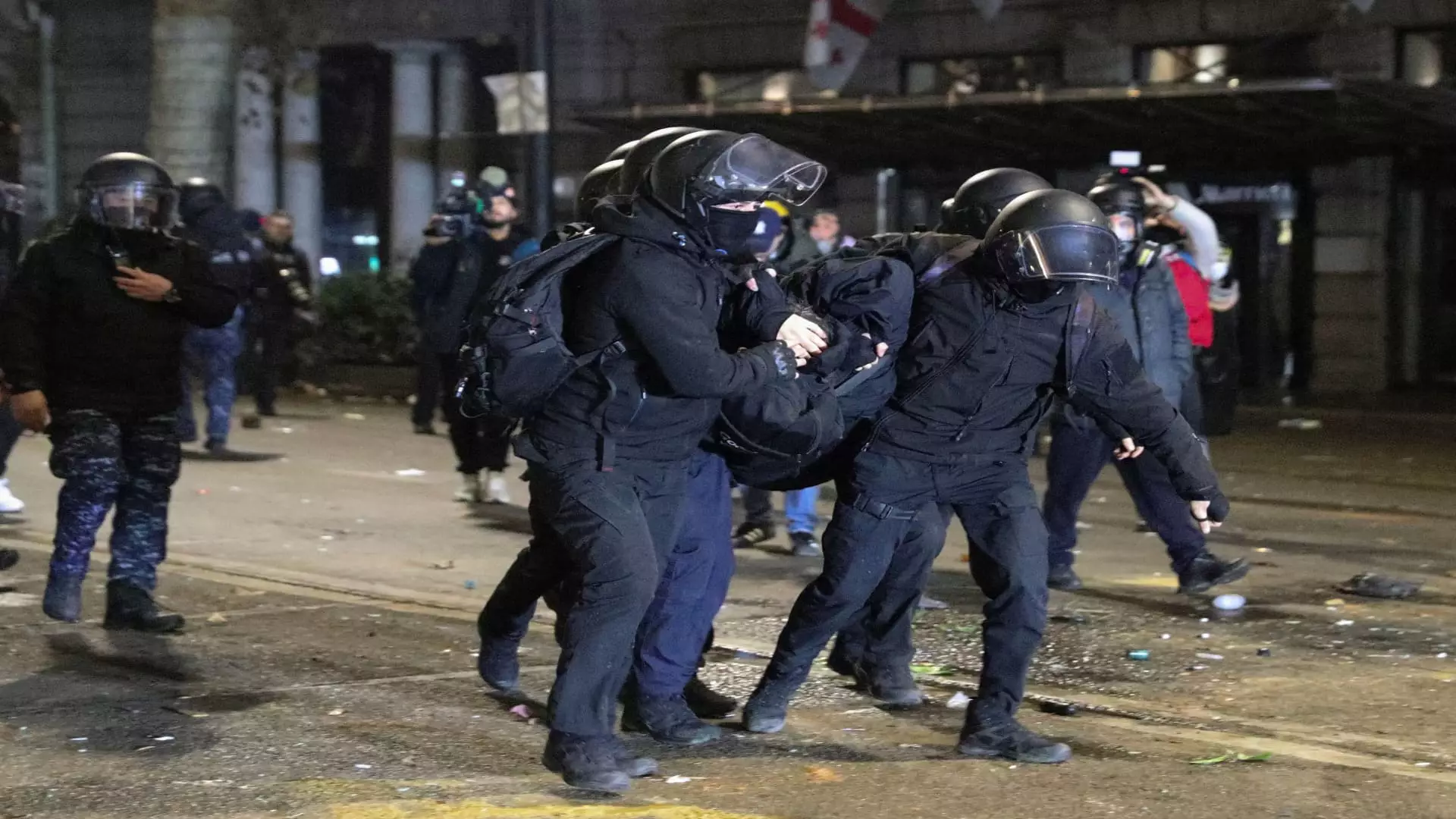Recent events in Georgia’s capital, Tbilisi, have ignited widespread demonstrations that stem from public discontent with the government’s decision to halt negotiations for European Union accession. As thousands of citizens converged on the parliament, tensions escalated, resulting in violent clashes between protesters and law enforcement. Over the course of three days, around 44 individuals were left seeking medical attention, highlighting the fervor and unrest within the population, which is increasingly concerned about their nation’s political trajectory.
The intensity of the protests peaked on a recent Saturday night, leading to incidents of projectiles being hurled at police and fireworks illuminating the turbulent atmosphere. This display of anger was visually encapsulated by the burning effigy of Bidzina Ivanishvili, the enigmatic founder of the ruling Georgian Dream party known for his wealth amassed in Russia and his considerable influence within the country. Such actions indicate a profound dissatisfaction with the current administration and its policies.
In response to the civil unrest, Prime Minister Irakli Kobakhidze issued stern warnings, emphasizing the likelihood of legal repercussions for those who breach the law during these demonstrations. His remarks followed a backdrop of international concern after the European Parliament released a resolution that described Georgia’s last general elections as flawed. Interestingly, Kobakhidze defended the government’s abrupt pivot away from EU negotiations, asserting that this was a reaction to what he termed “shameful blackmail” rather than a complete withdrawal from European aspirations.
Contrario to this, critiques from both domestic and international entities have been unrelenting. The U.S. State Department expressed unease at the cessation of Georgia’s efforts to join the EU, depicting this shift as part of a broader narrative set by the outgoing administration to burden its successor—this assertion indicating a deeply entrenched political atmosphere where legacy and continuity are contentious subjects.
The response from the European Union has further complicated Georgia’s political landscape. EU Commission officials expressed disappointment at the government’s decision, labelling it a significant deviation from previous governments’ pro-EU stance, which resonates strongly with the Georgia populace’s constitutional motives to integrate with Europe. The EU’s position illustrates a clear concern: the gradual erosion of democratic principles in Georgia.
Statements from EU foreign policy leaders, Kaja Kallas and Marta Kos, emphasize their apprehension regarding the country’s drift from democratic norms and the right to peaceful assembly—critical indicators of societal stability and political legitimacy. The pressure from international stakeholders suggests that Georgia’s future might hinge not just on its internal governance but also on its ability to maintain favorable international relations amid rising discontent.
The opposition parties in Georgia have rallied around the narrative of corruption and manipulation, alleging that the recent election was marred by interference from Russia—a nation with a historical grip on Georgian politics. Leaders like President Salome Zourabichvili have not shied away from denouncing the current administration, labeling the nation a “quasi-Russian” state. Her calls for fresh elections signal a potential pivot towards a more robust institutional reform aimed at restoring public trust and ensuring electoral integrity.
Zourabichvili’s demands resonate with a populace fatigued by political turmoil and disillusioned by the prospects for EU accession, illustrating a critical juncture in the nation’s democratic development. The stakes are high: Georgian public sentiment increasingly reflects a desire for a government that prioritizes transparency, accountability, and alignment with European values.
Georgia finds itself at a pivotal crossroads, grappling with internal dissent spurred by recent governmental shifts and external pressures from the European Union and the United States. The protests serve not just as an expression of frustration but as a clarion call for the hope of democratic accountability and alignment with European ideals. The coming days and months will prove crucial for the nation’s leadership, as it navigates both public sentiment and international expectations in a deeply polarized socio-political landscape. The outcome of these tensions may very well shape Georgia’s identity and position on the global stage moving forward.


Leave a Reply